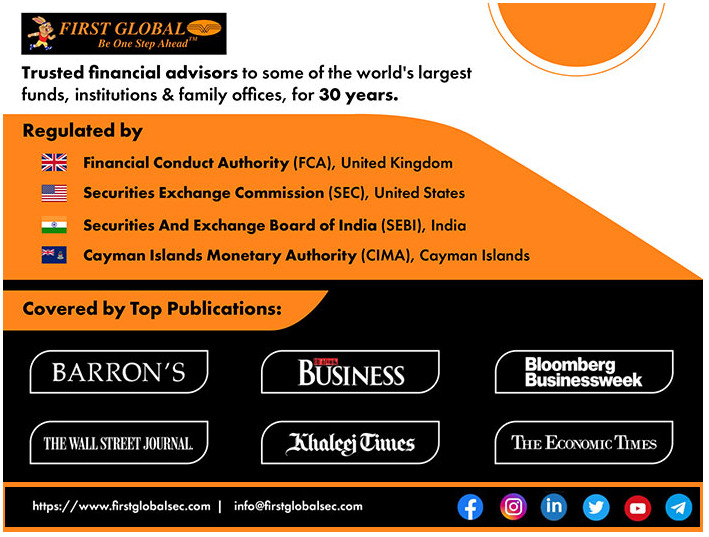We were having a chat with a Family Office Head the other day, who has large sums invested with us, in India and across the world.
At the end of half an hour, spent discussing the entire Investment landscape, he said: "It's clear that you own some amazing companies in your portfolios: Alkyl Amines, Navin Fluorine, Reliance, Muthoot, Thermo Fisher, Shopify, Logitech, LSE, JD, etcetera. How come I have not heard you speak lyrically, poetically, about even one of them? How come you have been very clinical, neutral, almost detached about these companies, these countries, rather than give me "stories" like: how great these managements are; how the businesses have strong moats and will remain great almost forever etc - That's the way every other fund manager I know speaks about their holdings".
Pretty interesting observation, we thought.
Indeed, why are we so clinical about Investing?
The real question you should ask is why do human beings tend to "Storify" their holdings or their views in general?
"Human beings aren't rational animals; we're rationalizing animals who want to appear reasonable to ourselves", said the famous social scientist, Elliot Aronson, author of 'The Social Animal'.
As human beings and in particular, social beings, we use stories to make sense of the world.
Remember a famous election?
That was little or no hard evidence or articulated strategy about how a country's problems of declining capital Investments would be solved.
It was simply a story, well told, well sold, that captured the imagination.
Data, facts and logic didn't matter, because most humans are simply incapable of acting on these.
The world is about tons of data which at times can take random directions. The world is about future probabilities, not certainties...yet the human mind wants a clear cause-effect-future path.
In other words, the world wants a Story.
This affinity for stories shows up not just in our day to day lives and not just among lay people but also professional investment managers.
The interesting thing is that with greater amounts of data being available, the need to "Storify" has increased even more.
This is because human beings are now deluged with tons of just data which is essentially unmanageable for them. And which they are completely incapable of analysing in a coherent, unbiased, neutral manner.
It is at this point that the human mind starts taking refuge in building lazy, under-analysed over-simplified opinions.
When a fund manager has long and perfect sounding arguments to justify why this company will go on doing well forever and why this particular management has a magic touch, it is almost always lazy opinions at work, with no room for any other interpretation of the future.
So why is a strategy based on 'storification' and 'high conviction' stocks, hugely risky for the investor?
Because when
A fund manager gives his/ her holdings a rose-tinted future, in which the only thing that is visible is a straight, long road of eternal growth, something that is known as consistent compounding
Ignores discordant, inconvenient elements (industry cycle, favorable policy, plain luck)
Speaks and writes publicly of their high conviction on there companies
When they are that deeply committed to these carefully edited, well-massaged stories,
Then
They cannot detach themselves from their attachment, even when the road ahead becomes rocky, ie, when facts change.
Love in investing is dangerous.
This is exactly what happened with Warren Buffett and his Coca-Cola Holding. He should have sold this stock several years before he actually did.
The data is brutal.
Coke has been a rabid underperformer since 1993.
In fact, Buffett should have bought Pepsi Instead of Coke.
|
From Jan, 1992 to July, 2020 |
||
|
Total Return |
CAGR |
|
|
Coke |
798% |
7.99% |
|
Pepsi |
2966% |
12.74% |
|
S&P500 |
1273% |
9.61% |
Why couldn't he pull the trigger?
Because he had storified this stock and its management massively and publicly.
In India, you would have heard the talk that you cannot go wrong buying 'blue chips' or consumer stocks with strong brands, moats & cash flows that are predictable for decades?
This Story is seductive.
And untrue.
Ever heard of Gillette India, ITC and Colgate?
They used to be part of this list of storied, branded consumer companies.
Till their stories went sour.
And very quietly, they went out of the list of these so-called Compounders.
This is what is called building a Story around the Survivors, or Survivorship Bias.
As Bill Gates said when Steve Jobs died, "Steve and I will always get more credit than we deserve, because otherwise the story gets too complicated.”
Which brings us to the next point.
Should you dismiss a story only when it is based on no facts at all? Actually the really dangerous stories are the ones that are true in one tiny part, where there is a small bit of truth but that is used to build a whole edifice which is floating in ether - exemplifying oversimplified, lazy opinions.
As Morgan Housel writes "...something that’s true but incomplete might be more dangerous than something that’s wrong, because a little truth is fuel for a lot of overconfidence."
The real world, particularly, in markets, things ARE complicated.
But the human mind cannot handle very complicated narratives.
In investing there are always known unknowns. Fashion changes, health trends (eg) against sugary drinks, new product disruptions, policy. The list is endless.
Things are rarely linear in real life for a large basket of companies. But they will always appear to be linear for company selected with complete hindsight or a selection of the survivors.
And based on these survivors, a vision of the future is painted in which absolutely everything is perfect, and as clear as a covid-period sky.
Reality is that, beyond a point nobody knows anything about anything.
Neither company management, nor fund managers, have any clue about what happens a few months down, let alone years.
All this means that the key to being a good investor is being alert and flexible, rather than being married to a story you have built up in your mind.
And falling in love with it.
One of the central pillars to being a successful investor is to be extremely flexible in one's thinking.
This has been one of our guiding principles of investment at First Global.
We bought Amazon in 2001. And we continue to hold a portion of it even now.
We bought Shopify in 2016. It's up 40x since.
But never ever in that 40x-300x journey, have we ever storifed, glorified Jeff Bezos or Tobias Lutke.
In our framework, they are mere mortals, enjoying a great run.
They can and will stumble. Or business circumstances will change.
And we won't have Amazon or Shopify then.
That's the First Global Investment Method.
We follow the data. Never the Mortal Human.
And that is why we never talked any stories with that gentleman, the other day.
From the desk of
Devina Mehra
Trusted Financial Advisors to some of the world's largest Funds, Institutions & Family Offices, for 30 years
If you want any help at all in your wealth creation journey, in managing your Investments, just drop us a line via this link and we will be right by your side, super quick!
Or WhatsApp us on +91 8850169753
Chat soon!


Economists Think Dollar's Fall May Explain the Recent ‘Rally’ by Steve Liesman
Einstein taught us about relativity in nature. Now come Devina Mehra and Shankar Sharma of First Global to teach us about relativity in financial markets -- and raise some serious questions about just what is driving stock prices.

First Global reports are quite credible and, on occasion, more than that.
What prompts this mention is Intel's earnings report and the fact that First Global has had a pretty good bead on the company and its stock.

AMD up again following First Global upgrade to ‘buy’ (AMD) By Tomi Kilgore
Analyst Kuldeep Koul at First Global upgraded Advanced Micro Devices (AMD) to "buy" from "outperform," given the "exceptional traction" that the chipmaker's Opteron line of processors has been able to get.

Baidu Climbs on First Global’s ‘Outperform’ Outlook
Baidu Inc., the operator of China’s most-used Internet search engine, rose to the highest price in two weeks after First Global rated the shares “outperform? in new coverage.

Personality counts: Walmart's frugal, but Target charms
"It's better to take a slight hit on [profit] margins and keep on moving and inventing," says First Global Securities. And at least for now, Target is inventing in a way that appeals to consumers with money to spend.

Dead Batteries
At 11 times trailing earnings, Energizer is cheaper; Gillette's multiple is 25. But cheaper doesn't mean better, says First Global.

Bipinchandra Dugam @bipinchandra90
@devinamehra @firtglobalsec
invested in both GFF-GTS and Super I50. Thank you very much for such wonderful investing experience with completely new approach. In my 15years of investing first product I felt which close to what customer want.

Shishir Kapadia @shishirkapadia1
@firstglobalsec @devinamehra
by far you are the best, I have not come across transparency, acumen, global expertise, exposure, protection of capital, delivering return from any fund/ fund managers. Invested very small size in 3 products will keep on increasing it over the period

Piyush Bhargava @PiyushB88762654
@devinamehra @firstglobalsec
Thanks you team FG specially Devina, my investment doubled in less than 3 years in SDPB As a investors & PMS distributor of your product looking to have a long-term relationship with the company.
@KarmathNaveen the person with whom I always interact

Sumeet Goel @GoelSumeet
Very happy & relaxed to be invested with first global pms

Shishir Kapadia@shishirkapadia1
Congratulations on super performance, above all transparency and systematic process are unmatchable.
One must opt this, if person consider him/her self as an investor. Very happy to be part of this since invested. FG has managed worst year (ie 2022) so efficiently and skillfully.

SY @SachinY95185924
With so much of volatility in the market, risk management is very important part & considering that FG is doing awesome work!!! Kudos to you Chief

Amit Shukla @amitTalksHere
Truly outstanding. As a retail subscriber to #fghum #smallcase, I can vouch for the Nifty beating returns (8% vs 3%) in last 1 year. Keep up the awesome work @firstglobalsec
We can load above testimonials on site as a scroller, and just below that we can add a section for compliments . Below tweets are comments and praises are related to our content, performance and some our direct compliments to you.

ADIT PATEL @ADITPAT11226924
Good team...
Special mention @KarmathNaveen .. he is soo helpful anytime of the day or night..

Hindustani @highmettle
Bought Peace with FG-Hum.Moving all funds from DIY investing to well managed and diversified PF at low cost.
It has doubled almost, excellent pick.Every small investor must invest in her FG-HUM Smallcase.

Suresh Nair @Suresh_Nair_23
I have 8 small cases and your has been the most rewarding ones .. thank you Devina.

Sayed Masood @SayedM375
There is absolutely no doubt that she is one of the best investors of India in modern times but more importantly, she shares the most sincere and sane advice with retail investors.

SY @SachinY95185924
Wow Superb Returns🔥 Congratulations Chief for being Number 1 among all PMS!!!
You are one of the sharpest mind in Global Stock Market

AnupamM @moitraanupam
Congratulations Devina, results talk in itself!

Abhishek @simplyabhi21
Congratulations ma’am @devinamehra ! The consistency you have in maintaining the top rank position is outstanding! 👏

Mihir Shah @Mihir41Shah
We are learning More about markets (& Life ) thanks to U than we learnt in our Professional courses.A BIg Thank You, Wish all get Teachers Like You!!

Sumit Sharma @MediaSumit
"The ability to be comfortable with being outside consensus is a superpower in investing...and in life." Devina ji hits the nail on its head!

Majid Ahamed @MajidAhamed1
Congratulations @devinamehra mam! All the best for long term returns as well.

Vinay Kumar @VinayKu05949123
This is the wonderful session I have ever attended till date. One of the most fruitful hour of my life. Devina madam, ur clarity on financial mkts is simply superb.The way u portray the facts supported by "data" about stock mkts is really astonishing.I will listen again.Thanks.

VIJAY @drippingashes
I loved to read your journey, insight and philosophy. It's a pleasure to read and know of your takes on market and life.

MNC🏹 @Focus_SME
Check & follow @devinamehra's timeline for lots of post debunking such rosy stories. Also, she gives amazing 🤩 sector directions/hints.

KLN Murthy @KLNMurthy2016
Good actionable insights, great article!

Suresh Nair @gkumarsuresh
Devina Madam is simply terrific... good knowledge, straight and simple thinking.
Very difficult to emulate such traits. I listen her past interviews from youtube.
Respect...!!!!

DD @AliensDelight
One of the brightest minds in the world of finance :)

Radhakrishnan Chonat @RCxNair
📣 Calling all investors! Just had an incredible interview with @devinamehra, Chairperson and MD of First Global. We discussed the importance of global diversification, effective asset allocation, and the risks of sitting on the sidelines. Trust me, you don't want to miss this!

siddarthmohta @siddarthmohta
Excellent performance. Flexibility is the key as you have mentioned it earlier also. Cannot have finite rules for infinite mkt opportunities.

Boom (বুম)@Booombaastic
To be honest, the insights which Devina madam brings in is very enriching..have learnt a lot from them...

Himanssh Kukreja @Himansh02428907
One of the most accurate analysts :)
I always look forward to you interviews mam

Abhijeet Deshpande @AbhijeetD2018
Madam, It is always a treat to read your insight, not only on business but on other topics also!!

Dada.AI @dada_on_twit
Thanks for this wisdom ma'am. Always love hearing your thoughts on everything equity. :-)

adil @zinndadil
Excellent points!
Can clearly feel this thread is a product of marination of many books and years of experience. 👍

Kamal thakur @Kamalgt10
Superb !!
Your knowledge, analysis & articulation is simply great 👍

Tanay @Tanay36232730
Follower on Twitter and Subsciber on YouTube of First Global, really helping me in my investment desicion. Thanks
Copyright 2019, All Rights Reserved. Developed By : Hvantage Technologies Inc. Maintain By : Aarav Infotech